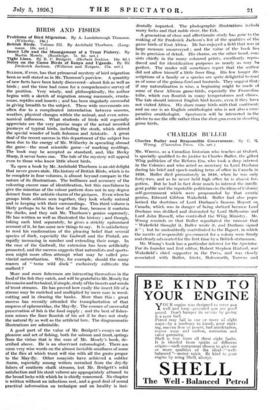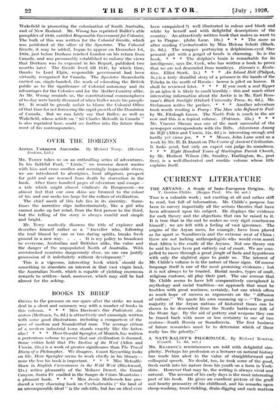CHARLES BULLER
Charles Buller and Responsible Government. By E. Wrong. (Clarendon Press. 158. net.) Mn. WRONG, as a Canadian historian who teaches at Oxford, is specially qualified to do justice to Charles Buller, the gifted Whig politician of the Reform Era, who took a deep interest in the Colonies and who acted as secretary to Lord Durham during his brief and epoch-making term of office in Canada in 1888. Buller died prematurely in 1848, when he was only forty-two, and as he never held high office he is almost for- gotten. But he had in fact done mach to interest the intelli- gent public and the reputable politicians in the ideas of Colonial self-government which were propounded by that crratia genius, Edward Gibbon Wakefield. Buller had also popu- larized the doctrines of Lord Durham's famous Report of( Canada, which was in danger of being shelved because Lord Durham was disliked and distrusted by Lord Melbourne an Lord John Russell, who controlled the Whig Ministry. Mr. Wrong reminds us that Buller repudiated the rumour that " Wakefield thought it, Buller wrote it, and Durham signed it" ; but he undoubtedly contributed to the Riport, in which the merits of responsible government for a colony were firmly and clearly advocated for the first time by a British statesman.
Mr. Wrong's book has a particular interest for the Spec! aloe, For its founder and first editor, Robert Stephen Hinton], win( Wakefield's chief supporter in the Press, and was closely associated with Buller, Grote, Molesworth, Torrens and Wakefield in promoting the colonization of South Australia, and of New Zealand. Mr. Wrong has reprinted Buller's able pamphlet of 1840, entitled Responsible Government for Colonies. The bulk of this was written for the Colonial Gazette, which was published at the office of the Spectator. The Colonial Gazette, it may be added, began to appear on December 1st, 1838, just before Durham reached London on his return from Canada, and was presumably established to enforce the views that Durham was to expound in his Report, published two months later. The Gazette lived till 1847, by which time, thanks to Lord Elgin, responsible government had been virtually recognized for Canada. The Spectator thenceforth carried on, single-handed, the work of educating the British public as to the significance of Colonial autonomy and its advantages for the Colonies and for the Mother Country alike. As Mr. Wrong reminds us, the constitutional commonplaces of to-day were barely dreamed of when Buller wrote his pamph- let. It would he grossly unfair to blame the Colonial Office of that time for not foreseeing the rapid growth of the Dominion of Canada. But we can fairly say that Buller, as well as Wakefield, whose article on " Sir Charles Metcalfe in Canada" is also reprinted here, could see further into the future than most of his contemporaries.











































 Previous page
Previous page